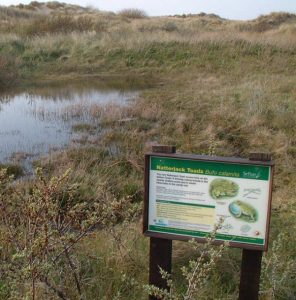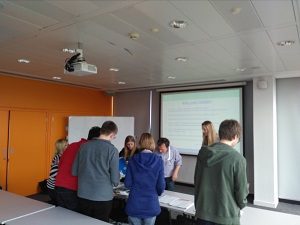ASIG: Paying to recognise quality and provide opportunity?
An Academia Special Interest Group blog, by ASIG Vice Convenor – Rev. Paul Rooney C.Env. MCIEEM
Who am I?

Sefton Dunes
The Institute of Ecology and Environmental Management (IEEM) was established in 1991 under the guidance of its first President Prof. Tony Bradshaw, one of my former tutors at university. I joined IEEM, now Chartered, in 1995 while working on the Sefton coast dunes, latterly as a Senior Ranger for the Sefton Coast Management Scheme. Following this, I was then appointed as the Project Officer for an EU co-financed LIFE project on the Sefton dune coast. These were very much ‘hands on’ roles in nature conservation involving either practical work or development of site management plans and conservation strategies. In these roles I was an ‘early adopter’ of the institute as I saw the value of the institute as a way of raising professional standards and promoting the profile of ecology and environmental management as professions. I paid the membership fees myself, but did claim them back against tax!
At the end of the EU LIFE project in January 1999 I joined Liverpool Hope University as a Lecturer. I maintained my membership of the institute as I was delivering courses in ecology and environmental management. In 2016 I put our BSc Environmental Science and MSc Ecology and Environmental Management forward for, and gained, professional accreditation from CIEEM. One of the conditions of accreditation is that at least one person involved in course delivery is a full member of CIEEM. That person was me and I was still paying the fees to the institute out of my own pocket. Roll the years forward and I am now Head of the Department of Geography and Environmental Science at Liverpool Hope, and I am still a member of the institute.
Professional accreditation of a course is important for a university in terms of providing an external recognition of course quality, acting as a tool for course recruitment and as a mechanism to enhance student employability.
What has this got to do with this Academic Special Interest Group?
Well, the point is that throughout my varied career I have always seen the importance of the institute, but it came to the point that through my fees to CIEEM I was paying to support my university and its students by enabling course accreditation. It was benefiting the students, but these are students who are paying the university course fees every year.
My university’s position is that they do not pay for professional subscription fees. This is not uncommon. A relation of mine works as an academic in another university and is a registered health professional. She and her colleagues have to pay considerable fees themselves each year to be ‘on the register’ allowing them to practice, and yet their students are paying fees to the university. It seems unfair to me for employees to be paying out so that a university can recognise course quality, operate and promote its courses and claim increased life prospects for its students; this on the back of the employee paying out their own professional fees. I think that a university should pay an employees’ professional fees in these cases.
So what did I do?
 Well, I sat down with my line manager and pointed out the situation and said I was not prepared to continue paying my fees. In effect, the university would have lost the course accreditation which would be, at the least, an embarrassment and at worst would hit course recruitment. The argument was accepted as the balance of benefit for the university was to pay my professional fees. Going forward, and now as the Head of Department I write in to new and relevant academic job descriptions that membership of CIEEM is desirable. When this is not present on appointment it is set as a target in probation and through annual reviews. I also have an agreement that professional fees will be paid to avoid the precarious situation of only one person being a full member of CIEEM, and to mitigate against staff changes in order to protect course accreditation.
Well, I sat down with my line manager and pointed out the situation and said I was not prepared to continue paying my fees. In effect, the university would have lost the course accreditation which would be, at the least, an embarrassment and at worst would hit course recruitment. The argument was accepted as the balance of benefit for the university was to pay my professional fees. Going forward, and now as the Head of Department I write in to new and relevant academic job descriptions that membership of CIEEM is desirable. When this is not present on appointment it is set as a target in probation and through annual reviews. I also have an agreement that professional fees will be paid to avoid the precarious situation of only one person being a full member of CIEEM, and to mitigate against staff changes in order to protect course accreditation.
So my suggestion is that you continue to recognise the value of CIEEM membership. It benefits the profession, you and your students. As we are in this awful market driven model of higher education, use it to your advantage and get the university to pay your fees. After all, engaging with your university to pay your professional fees asks them to recognise the professional status of ecology and environmental management. This is consistent with the founding aims of our institute.
